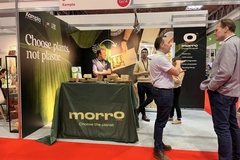
23 Jun 2022 --- Henkel’s dishwashing detergent brand Pril is now being supplied in 100% recycled PET bottles, with 50% of the material originating from Germany’s yellow bag waste system. The remaining recyclate is sourced from recycled PET beverage bottles. Henkel plans to increase the volume of yellow bag recyclate further in this application and extend it to other brands.
Austrian plastics manufacturer Alpla, which supports Henkel in its transition to more circular packaging, stresses that investment in modern recycling structures is only possible if there is sufficient industry demand for recycled material from yellow bag waste. Therefore, Henkel’s move “sends out an important message,” says Dietmar Marin, managing director of recycling at Alpla.

Yellow bag waste is becoming an increasingly important source of material for environmentally sustainable packaging. However, according to Alpla, the recycling rate of packaging materials collected via the dual system in Germany is still low. This issue is in part due to the complexity of the sorting process and the reprocessing of this material.
“Packaging materials collected through yellow bag waste are significantly more diverse in nature than returnable bottles and are often very contaminated,” explains Carsten Bertram, head of international packaging development dishwashing at Henkel.
“For a long time, high-quality recyclate from yellow bag waste was therefore unavailable in sufficient quantity. However, the collaboration with Alpla is an important step forward.” The Pril bottles consist of 100% recycled PET, 50% of which comes from the yellow bag system (Image credit: Henkel).
The Pril bottles consist of 100% recycled PET, 50% of which comes from the yellow bag system (Image credit: Henkel).
Germany’s Dual System
In Germany and Austria, plastic, metal or composite waste, including packaging, can be discarded in yellow transparent plastic bags for recycling. The yellow bags are part of Germany’s Dual System for waste management.
Alpla has been cooperating with Henkel on circular packaging solutions for several years and continuously expanding its sorting and recycling technologies. At the beginning of last year, Henkel introduced packaging made from recycled material sourced from yellow bag waste for some of its products.
Now, Henkel has switched all of its packaging for dishwashing detergent produced in Germany to premium PET recyclate sourced from yellow bag waste. In the future, Henkel will increase the volume of recycled material from yellow bag waste and extend it to other consumer products.
Circular economy targets
Alpla aims to use 25% recycled material in the total processed material of its products by 2025. Furthermore, all packaging solutions are to be fully recyclable by this time. The company is investing at least €50 million (US$52.5 million) annually to achieve this.
Henkel is also aiming to make all of its packaging fully recyclable or reusable by 2025. In addition, it seeks to reduce the volume of new plastics from fossil sources in its product packaging by 50% while increasing the volume of recycled material to over 30%.
“To enable a functional circular economy for the long term, it is important that all packaging be made fully recyclable, the necessary recycling infrastructure and corresponding technologies be in place, and post-consumer recyclate be reused as a matter of course in the production of new packaging,” says Bertram.
In related news, BASF and Henkel are partnering to replace fossil carbon feedstock with renewable feedstock for most products in Henkel’s European Laundry & Home Care and Beauty Care businesses over the next four years. The move follows a pilot with Henkel’s cleaning and detergent brand Love Nature in 2021.
By Joshua Poole












